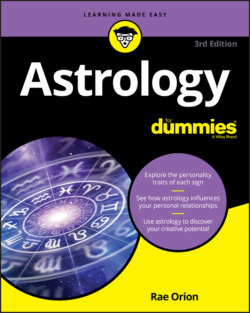Читать книгу Astrology For Dummies - Rae Orion - Страница 49
Appreciating Arabic astrologers
ОглавлениеAfter the Roman Empire collapsed in 476 CE, the golden aura of astrology dimmed in Europe and what had been the Roman Empire. In the Byzantine Empire, in Arabic lands, and throughout the Middle East, it continued to glow. Astrology could be found everywhere from the shipyards to the courts, where astrologers held official positions and received salaries. Even so, astrology did not meet with universal approval, especially after the rise of Islam in the seventh century. Muslim religious leaders, who felt that only God could predict the future, attacked astrology, as did a number of influential philosophers and poets. And still, the “science of the decrees of the stars,” as it was called, continued to attract adherents.
In the year 762, leaders of the Abbasid Caliphate founded a new capital city on the Tigris River with the help of astrologers, among them an Arab Jew named Masha’Allah, who chose an auspicious time to begin construction. A few years later, Baghdad’s first astrology school opened. The philosopher al-Kindi, whose writings ranged from cryptography to music to how to make perfume, was the first head of that school. He wrote about the 960-year Jupiter-Saturn cycle; the 97 so-called Arabic parts or lots, imaginary points derived according to formulae and symbolizing just about everything; and the stellar rays that he believed explained the power of the stars.
Throughout this period, tremendous work was being done in astrology, philosophy, mathematics, astronomy and other disciplines. Still, there was always debate about astrology. In the ninth century, an astrologer named Abū Ma‘shar (aka Albumasar) wrote a vigorous defense with an introduction that was translated into Greek and Latin, distributed widely, and pored over for centuries. In the eleventh century, the brilliant Muhammad ibn Ahmad al-Bīrūni was asked to create a textbook on astrology. He did so, covering the entire enterprise of Islamic astrology. But at the same time, mindful of possible criticism, he protected himself, explaining that he was only trying to show the intelligent reader what to avoid and to assist the indigent astronomer in making a living.
During the Golden Age of Islam, extending roughly from the eighth century through the thirteenth, mathematicians, engineers, astrologers, astronomers and other scientists made tremendous advances, the invention of algebra being one example. But the most important work done during this period was translation. Arabic scholars translated classical writers such as Aristotle, Ptolemy, his contemporary Vettius Valens, and the Hellenistic astrologer/poet Dorotheus of Sidon into Arabic from Greek, Sanskrit, Persian, Indian and other languages. Later, when many of those classical works were lost in Europe, Arabic translations allowed them to be reclaimed. Centuries of Arabic scholarship kept learning alive.
